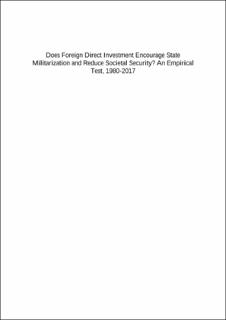Does Foreign Direct Investment Encourage State Militarization and Reduce Societal Security? An Empirical Test, 1980-2017
Peer reviewed, Journal article
Accepted version

Åpne
Permanent lenke
https://hdl.handle.net/11250/2655310Utgivelsesdato
2019Metadata
Vis full innførselSamlinger
Originalversjon
https://doi.org/10.1515/peps-2019-0011Sammendrag
Scholars debate the effects of foreign direct investment (FDI) on poor societies. Apparently, FDI could embolden governments to securitize rather than reform, an argument put forth recently by (Kishi, Roudabeh, Maggio, Guiseppe, & Raleigh, Clionadh. (2017). Foreign investment and state conflicts in Africa. Peace Economics, Peace Science and Public Policy, 23(3), https://doi.org/10.1515/peps-2017-0007) who supply evidence within a sample of Sub Saharan African countries showing that FDI increases the number of conflict events. This study takes a critical view of their argument on conceptual and methodological grounds. Using new data for the entire world as well as a sample of developing countries, this study directly tests securitization as militarization measured as military spending and the size of armed forces and finds that several alternative measurements of the stock and flow of FDI reduces militarization, results that are robust to fixed effects estimations, Heckman selection models, and models with and without controls for ongoing armed conflict and interstate tension. Testing an Africa-only sample yields no statistically significant effects either way, but compared to the global sample, an interaction of FDI in Africa does show a positive effect. This result, however, is substantively very slight compared with the net effect of the African region where military spending is unusually greater than in other regions, but size of armed forces are smaller. These results are replicated using a measure of societal security capturing more than just the absence of war as measured by the World Economic Forum’s data. If FDI increases security without increasing militarization, then FDI is potentially a sound source of finance for poor countries. Case-study-based research might usefully unpack the political economy of defence spending in Africa and identify precisely how TNCs can be implicated in the story. Our results show, however, that generally, FDI might actually reduce militarization while increasing societal security beyond just the absence of armed violence.